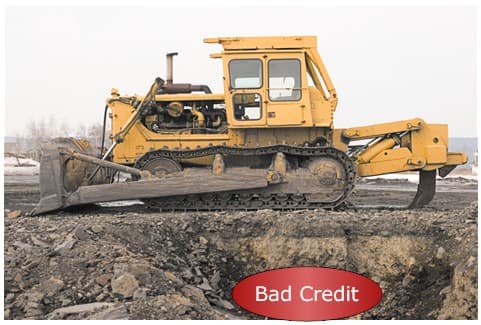- Before purchasing a home, prepare your budget and repair your credit.
- Sub-prime loans are sometimes the only option for self-employed with high DTI ratio.
- FHA loans have easier credit score requirements for bad credit home loan borrowers.
Bad Credit Home Loans - Digging Yourself Out of a Hole?
Poor credit makes it difficult to obtain a mortgage home loan.
It takes good preparation to get the best home loan when you are purchasing a home. If you start with poor credit, then you will first need to dig yourself out of a hole. You may not need a bulldozer to accomplish your task, but you will need hard work and good preparation.
Although there are different home loan products, the most stable one is a 30-year FRM (Fixed Rate Mortgage). That is a long-term commitment, so make sure that you are ready for it. If you have poor credit and you are looking for a home loan, then learn how to:
- Prepare a financial plan and Repair your credit
- Find Alternatives for Poor Credit and Home Loans
Make a Financial Plan to Buy Your House.
Bad credit makes buying a home a more difficult event. Before you buy a house and take a home loan, make a financial plan that starts with a personal budget.
Buying a house and taking a home loan means that you can afford the monthly payments, have enough saved to cover the down payments, closing costs, and reserve funds necessary to take a mortgage loan.
Pay attention to these requirements:
Credit Score: Poor credit is usually associated with a bad FICO credit score, although your DTI ratio is just as important. Monitor your credit report, dispute items that are not correct, and make sure that you make timely payments. Negotiate settlements on collection accounts, where possible, or pay them to bring the account to a $0 balance. Collection items can kill a home loan, depending on their size and age. Check with your loan officer, to see if you will be required to pay the collection account in order to be approved for the loan.
For more information read the Bills.com article about credit repair and improving your credit score.
Down payment: A conventional loan requires a down payment of at least 20%, or taking mortgage insurance to cover any additional sums borrowed. A FHA loan requires only 3.5% down payment, but requires mortgage insurance. When keeping your budget make sure that you are saving enough money for a down payment. Don’t forget to also save for a rainy day fund (6 months of living expenses) as well as extra closing costs for the purchase and the loan.
DTI (Debt to Income Ratio): Any lender will want to see that you can afford to make the payments. The general rule of thumb is that no more than 36% of your monthly income goes to pay your monthly housing (including mortgage, property insurance, property tax, HOA fees) and your other debt payments (including credit cards, student loans, auto loans). Fannie Mae conventional loans allow for a 36% - 45% DTI ratio or even higher with compensating factors. FHA loans have stricter rules allowing for 31% housing DTI ratio and 43% overall DTI ratio.
Underwriting criteria and guidelines are complex. There are lengthy and technical rules regarding income validation and verification. Prepare your finances, and use your lender as a guide.
Rent vs. buying: Buying is not always the best solution. Poor credit means taking out a loan with high interest and fees. By renting and at the same time saving money and repairing your credit you can dig yourself out of the poor credit hole, and position yourself for a home loan with better terms.
Poor Credit Home Loan Alternatives
There are alternatives for poor credit home loan alternatives, however move with caution. Defaulting on home loans is stressful, so don’t rush into a loan that you cannot afford. Remember, lender’s strict guidelines protect both you and the lender.
Subprime loans: Subprime loans virtually disappeared after the 2008 economic crisis; however, they have made a little small comeback in early 2012. In general I recommend to stay away from subprime loans, that come with high interest rates and high fees. However, subprime loans come with may be the only alternative for some people who have good credit scores, but income that is hard to verify or too low for the lender’s DTI ratio requirements. This is especially true for self-employed with many tax deductions.
FHA loans: FHA loans have low credit requirements, with a minimum FICO score or 580. Because conventional loans and lenders have stricter requirements, FHA loans have become the most popular home loans, especially for borrowers with poor credit.
Spouse with good credit purchases: If one spouse has good credit, FICO score and DTI, then he or she can purchase the property and take a conventional home loan in their name only. Whereas a conventional loan does not require information about the non-purchasing spouse, a FHA loan requires, if you are in a community state, that the non-purchasing spouse, submit income information in order to qualify for the DTI requirements. A credit history is also run, but not used to determine qualification.
Co-signer: A conventional loan will not use a co-borrower, if the purchaser does not qualify. However, an FHA loan allows for a non-occupying co-borrower, who is a family member. Co-signing helps the poor credit borrower obtain a home loan; however, the co-borrower is liable for the whole loan. No matter which alternative you choose, remember to plan correctly, maintain a budget, and make your payments on time, and repair your credit as much as possible. Even if your first home loan is taken with poor credit, make it your financial goal to refinance or take your next home loan with good credit and better terms.
